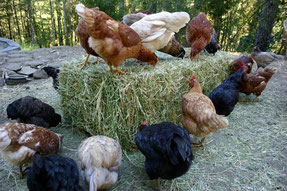What is a good balanced diet for laying garden hens
- Layers pellets provide the protein and calcium laying hens need to produce hard shelled healthy eggs. Layers pellets are best fed in the morning.
- Mixed corn provides energy and when scattered encourages hens and chickens to scratch around. It is best fed in the afternoon.
- Grit provides some calcium, but because chickens don't have teeth the main purpose will be to help the hen grind up the food in its gizzard. The mixed grit featured below contains calcium.

More information about, how to feed and look after laying hens in your garden here; How to keep garden hens
This mix makes up the daily feed for garden laying hens
Quality nutrition for healthy hens and lovely eggs,
Manufactured in the UK by poultry feed millers for over 100 years.
17% protein and high in energy and oils
Packed in a durable 20kg plastic bag.
Quality Assured Cut Maize
Robust plastic packaging
Mixed Corn is essential for keeping your hens healthy. It is a mix of wheat and cut maize and when fed with layers pellets will maintain a balanced diet for laying hens.
Mixed Poultry Grit is a combination of soluble and non-soluble grits to help maintain a healthy hen, ensuring your poultry has essential minerals.
- Insoluble hard grit is of great benefit to all poultry. In the gizzard it acts as the birds teeth and performs the grinding action necessary to make the food digestible.
- Soluble soft calcium grit dissolves into the hens system ensuring that the eggs are produced with strong shells. This is a complete product giving the correct balance of two very essential minerals.
-
See my article for feeding laying hens looking after chickens in your garden
Can I feed my hens garden produce and leftover cooked fruit and vegetables?
Yes you can feed hens garden produce and leftover cooked fruit and vegetables.
Hens housed in a coop and chicken run that don't have access to green stuff will benefit from and enjoy being fed cabbage and other fruit and vegetable kitchen leftovers.
Hens kept in the garden for eggs, actually enjoy vegetable peels, bananas, apple cores, carrots, broccoli even spaghetti and porridge. In fact, laying hens can be fed almost any wholesome food, vegetable or fruit you eat yourself. If you can eat it so can your hens and you can feed them this daily as part of a balanced diet. That should include the mixed corn, layers pellets and grit I have listed above.
I have found over the many years I have kept layers. That. one of the many benefits of keeping chickens is most of my kitchen waste and stuff I grow in my garden. Can be fed to them ensuring they get a varied and balanced diet, saving me some money too.
Avoid feeding your chickens any raw green peels (such as green potato peel) and citric fruits such as oranges and lemons. All fatty foods or foods with a lot of salt in it, also sweets (to much sugar) and processed food (to much of everything that is bad) and poisonous garden plants and weeds like foxgloves and bindweed. If it is bad for you it is bad for your hens.
Chickens are fairly good at knowing what not to eat and will avoid anything really nasty.
Feeding your Hens and chickens in Winter weather.
-
One of the most important things to provide for chickens in freezing weather is fresh water, remember to break up any ice that forms on top. Check the water two or three times a day and change it if it gets muddy.
- During winter the chickens will use up more calories just staying warm so give them an added ration of mixed corn or grains. Also, in winter the chickens and hens won't find the same amount of protein they get from worms and insects, so make sure to feed them good quality layers pellets.
- Greens are important in the winter. Feed the same amount you did in summer. Slightly more if your hens and chickens were allowed to roam around your garden or were housed in a movable run on a lawn.
My article about feeding laying hens looking after chickens in your garden
Writing your first book or novel? This new website provides advice and tips to help write, edit, publish, market and promote it https://www.faircop.com/
